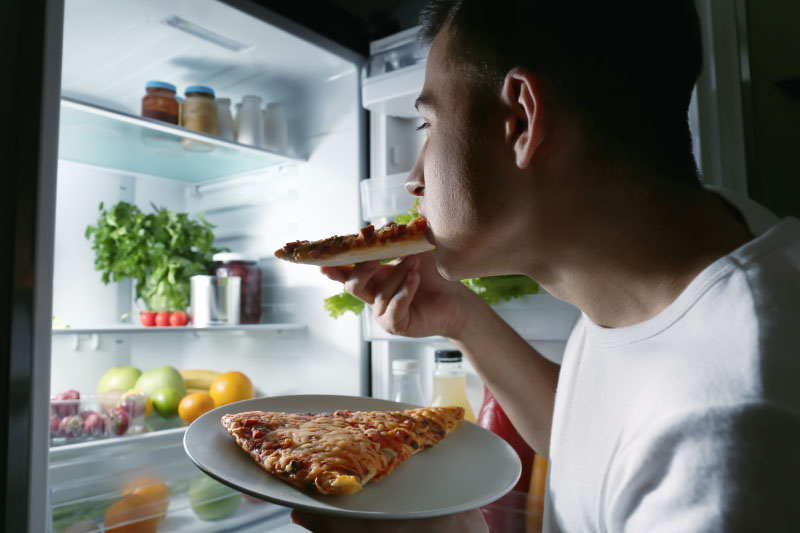3 Pros and 3 Cons of Late Night Eating
Are those late-night snacks and meals worth it?

Is late-night eating bad for you? Will it make you gain weight, or is it better to get something in your stomach before you head to bed? Fortunately, data exists to support both outcomes.
To add to the confusion, most diet advice is on what to eat, not when. So before opening that fridge tonight, here are three pros and three cons of late-night eating to consider.
Pro: Some snacks may help you sleep.
Instead of lying in bed listening to your stomach rumble, try grabbing a handful of pistachios. Pistachios are a natural source of melatonin, which can sometimes help people fall asleep.
You can also try making half of a turkey sandwich. The tryptophan chemicals in turkey may help you relax, the same way that you tend to get drowsy after a Thanksgiving turkey dinner. Late-night eating can take away the hunger pangs so you can sleep and be more refreshed in the morning.
Pro: Snacking may help your metabolism stay regular.
If you’re really hungry, your body might be telling you something. Simply going hungry, especially on a regular basis, can actually cause you to gain weight.
When you haven’t eaten for a long time, your body can slip into starvation mode, where your body starts storing more fat. It’s best to listen to what your body needs. Harvard Medical school recommends eating regularly as one of the best ways to achieve a healthy weight.
Pro: Protein-filled snacks aid in rebuilding muscle while you sleep.
Late-night eating can be a boost for your muscles if you worked out earlier in the day. Choose snacks that are high in protein, such as cheese, nuts, or chickpeas, to prep your body to rebuild while you sleep.
Related: Snacks under 250 Calories That’ll Tide You Over until Your Next Meal
Con: You may not actually be hungry.
If you’re eating late at night, you could just be bored or stressed. Cravings for salty food might be an indication of dehydration, rather than a sign of an empty stomach.
And if you’re eating really late, your body may be trying to get extra energy to keep you awake for longer than is normal. In all of these cases, your body doesn’t need food. Skip the extra calories and figure out what your body is really asking for.
Con: Your metabolism is slower at night.
A study done on two groups of mice showed some interesting results about late-night eating. Although all the mice had the same diet, the ones that ate at irregular intervals, including late at night, gained more weight.
Your body thinks it’s supposed to be winding down for the evening and preparing to sleep, not digesting food. A slower evening metabolism means that late-night eating is more likely to make you pack on pounds.
Con: Eating late usually includes high-calorie food.
Most people aren’t feeling up to cooking a three-course meal late at night, so nighttime snacking usually includes chips, cookies, fast food, and other easy-to-grab, high-calorie items.
WebMD points out that late-night eating is also usually uncontrolled. Eating in front of a TV or a laptop can make you lose track of how much you’ve eaten. This huge dose of calories with little nutritional value is a choice you should think twice about.
With all these pros and cons, how do you decide whether to make that midnight snack run? The first thing you should do is a check in with yourself. How is your mental health? Are you tempted to eat because you are anxious, bored, or sad? When was the last time you ate?
Related: What to Eat for the Midnight Munchies
Ask yourself what kinds of nutrition you’ve had throughout the day and how much you have exercised. The next step is to take a drink of water. Wait five minutes to see if the water soothes your stomach before you dig into that bag of chips. If you decide that you are hungry, then opt for foods that are high in protein and fiber to keep you full and help you sleep better.

